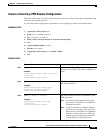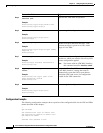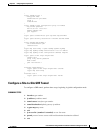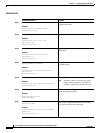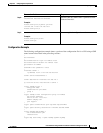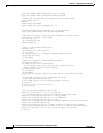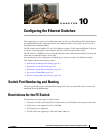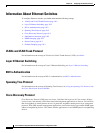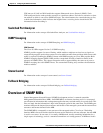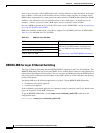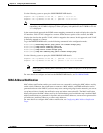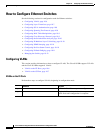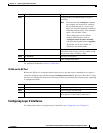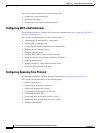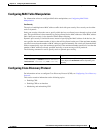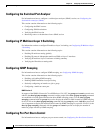
10-3
Cisco 819 Series Integrated Services Routers Software Configuration Guide
OL-23590-02
Chapter 10 Configuring the Ethernet Switches
Overview of SNMP MIBs
CDP runs on all LAN and WAN media that support Subnetwork Access Protocol (SNAP). Each
CDP-configured device sends periodic messages to a multicast address. Each device advertises at least
one address at which it can receive SNMP messages. The advertisements also contain the time-to-live,
or hold-time information, which indicates the length of time a receiving device should hold CDP
information before discarding it.
Switched Port Analyzer
For information on the concept of Switched Port Analyzer, see Switched Port Analyzer.
IGMP Snooping
For information on the concept of IGMP Snooping, see IGMP Snooping.
IGMP Version 3
The Cisco 819 ISRs support Version 3 of IGMP snooping.
IGMPv3 provides support for source filtering, which enables a multicast receiver host to signal to a
router which groups the receiver host wants to receive multicast traffic from and from which sources this
traffic is expected. Enabling the IGMPv3 feature with IGMP snooping on Cisco ISRs provides Basic
IGMPv3 Snooping Support (BISS). BISS provides constrained flooding of multicast traffic in the
presence of IGMPv3 hosts. This support constrains traffic to approximately the same set of ports as
IGMPv2 snooping does with IGMPv2 hosts. The constrained flooding only considers the destination
multicast address.
Storm Control
For information on the concept of storm control, see Storm Control.
Fallback Bridging
For information on the concept of fallback bridging, see Fallback Bridging.
Overview of SNMP MIBs
Simple Management Network Protocol (SNMP) development and use is centered around the
Management Information Base (MIB). An SNMP MIB is an abstract data base and it is a conceptual
specification for information that a management application may read and modify in a certain form. This
does not imply that the information is kept in the managed system in that same form. The SNMP agent
translates between the internal data structures and formats of the managed system and the external data
structures and formats defined for the MIB.
The SNMP MIB is conceptually a tree structure with conceptual tables. Cisco Layer 2 Switching
Interface MIB is discussed in more detail in the next section. Relative to this tree structure, the term MIB
is used in two senses. In one sense, it is actually a MIB branch, usually containing information for a
single aspect of technology, such as a transmission medium or a routing protocol. A MIB used in this



